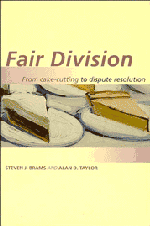Book contents
- Frontmatter
- Contents
- List of figures
- List of tables
- Acknowledgments
- Introduction
- 1 Proportionality for n = 2
- 2 Proportionality for n > 2: the divisible case
- 3 Proportionality for n > 2: the indivisible case
- 4 Envy-freeness and equitability for n = 2
- 5 Applications of the point-allocation procedures
- 6 Envy-free procedures for n = 3 and n = 4
- 7 Envy-free procedures for arbitrary n
- 8 Divide-the-dollar
- 9 Fair division by auctions
- 10 Fair division by elections
- 11 Conclusions
- Glossary
- Bibliography
- Index
5 - Applications of the point-allocation procedures
Published online by Cambridge University Press: 05 July 2011
- Frontmatter
- Contents
- List of figures
- List of tables
- Acknowledgments
- Introduction
- 1 Proportionality for n = 2
- 2 Proportionality for n > 2: the divisible case
- 3 Proportionality for n > 2: the indivisible case
- 4 Envy-freeness and equitability for n = 2
- 5 Applications of the point-allocation procedures
- 6 Envy-free procedures for n = 3 and n = 4
- 7 Envy-free procedures for arbitrary n
- 8 Divide-the-dollar
- 9 Fair division by auctions
- 10 Fair division by elections
- 11 Conclusions
- Glossary
- Bibliography
- Index
Summary
Introduction
Our thesis in this chapter is that AW is not simply a fair-division procedure with desirable theoretical properties. It is also one that is eminently practicable in a variety of situations, ranging from international disputes to divorce settlements.
We begin section 5.2 by showing how AW might have been used in facilitating the resolution of the dispute between the United States and Panama over the Panama Canal treaty, which was negotiated in the 1970s and involved ten issues. In sections 5.3 and 5.4 we illustrate the application of AW to two divorce cases, one hypothetical and one real (from New York state). In the real case, AW probably would have produced a different resolution, which the dissenting judge in this case, when heard on appeal, supported. As a final application of AW, we revisit in section 5.5 the problem of dividing up the Vermont estate, which was first discussed in section 1.2, and compare this division with the division obtained using Knaster's procedure, which was described in section 3.2.
Knaster's procedure, when applied to two-party disputes involving multiple issues, bears some resemblance to AW insofar as the bids that the players make may be thought of as their placing points on the items to be divided.
Information
- Type
- Chapter
- Information
- Fair DivisionFrom Cake-Cutting to Dispute Resolution, pp. 95 - 114Publisher: Cambridge University PressPrint publication year: 1996
